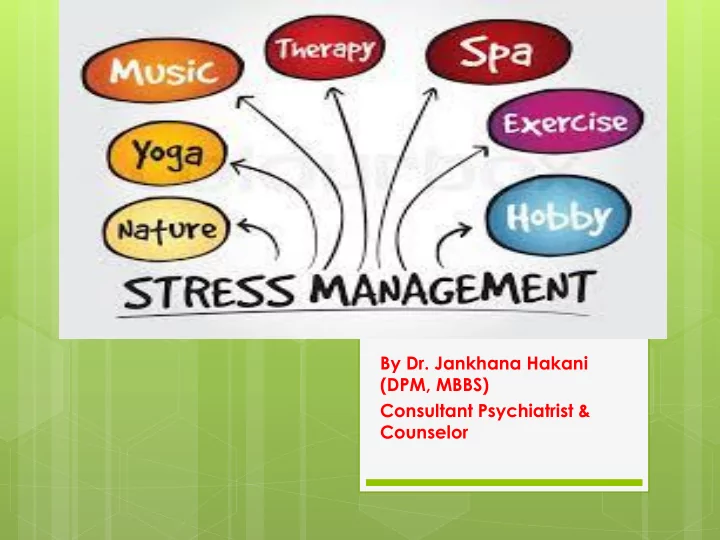

STRESS MANAGEMENT By Dr. Jankhana Hakani (DPM, MBBS) Consultant Psychiatrist & Counselor
What is Stress? Stress = Pressure > Resources It is overwhelming. Wish we had more hours in a day. Work & daily responsibilities are always demanding. It feels like we can do nothing about Stress
Stress is ‘Wear and Tear’ that our minds and bodies experience as we attempt to cope with our continually changing environment
How do you Feel when you are stressed?
Worry Frightened Irritable Tense Tired Depressed Anxious Elated
CAUSES OF STRESS External Internal
EXTERNAL CAUSES OF STRESS Physical environment Social interaction Organizational Major life events Daily hassles
INTERNAL CAUSES OF STRESS Lifestyle choices Negative self- talk Mind trap Personality traits
TYPES OF STRESS Positive stress (Eustress) Negative stress (Distress)
POSITIVE STRESS Has a positive effect Spurs motivation & awareness Stimulates to cope with challenging situations Improves performance Feels exciting Energizes us
NEGATIVE STRESS Outside of coping abilities Feels unpleasant Decreases performance Contributing factor in various illness like headaches, digestive problems, sleeplessness, skin problems, etc.
BURNOUT Excessive negative stress For long duration Results in harmful mental, physical and spiritual health Complete exhaustion
THE INDIVIDUAL Unique perceptions Unique experiences unique coping mechanisms
MOST STRESS IS ‘SELF GENERATED’
THE STRESS RESPONSE “Flight/ fight response” Controlled by endocrine system Any form of demand from the mental or physical systems results in release of hormones : adrenaline, cortisol, testosterone
GENERAL ADAPTATION SYNDROME Alarm response Adaptation phase Exhaustion phase
SYMPTOMS OF STRESS Physical Mental Behavioural Emotional
STRESS RELATED ILLNESS Cardiovascular Immune system Asthama Digestive problems Headaches Depression Panic attacks
WHY MANAGE STRESS? Stress affects emotional, physical, social equilibrium. It narrows ones ability to think clearly, function effectively & enjoy life. Stress management helps in attaining a balance life with time for work, relationships, relaxation & fun alongwith resilience to hold up under pressure & meet challenges head on.
HOW TO MANAGE STRESS? Identify the source of stress. Types of stress- 1. Major Stress 2. Chronic Stress Chronic stress can be more complicated.
HOW TO IDENTIFY TRUE SOURCES OF STRESS Look at your habits, attitude & excuses. Do you explain away stress as temporary. Do you define stress as an integral part of your work/ home life? Or you blame it on your personality? Do you blame your stress on other people?
ACCEPT RESPONSIBILITY
STRESS JOURNAL WHAT HOW U FELT, HOW YOU WHAT YOU DID CAUSED PHYSICALLY & ACTED IN TO MAKE YOUR EMOTIONALLY RESPONSE TO YOURSELF FEEL STRESS STRESS BETTER
REPLACE UNHEALTHY COPING STRATEGIES WITH HEALTHY ONES Withdrawing from friends and family Procrastinating Zoning out for hours looking at your phone Filling up every minute of the day to avoid facing problems Sleeping too much Taking out your stress on others Drinking, Smoking, Taking drugs
FOUR A’s OF Stress Mgx AVOID ALTER ADAPT ACCEPT
AVOID Learn to say “NO” Avoid people who stress you out Take control of your environment Pare down your ‘to - do’ list
ALTER the situation This involves changing the way you communicate and operate in your daily life. Express your feelings instead bottling them up Be willing to compromise Create a balanced schedule
ADAPT to the stressor This involves changing your expectation & attitude. Reframe problems, have a positive perspective Look at the big picture Adjust your standards, be ok with ‘good enough’ Practice gratitude
ACCEPT the things you can’t change Don’t try to control the uncontrollable Look for the upside Learn to forgive Share your feelings
GET MOVING PHYSICAL ACTIVITY Put music & dance around Take your dog for a walk Walk or cycle to work Use the stairs at home or work rather than an elevator Play some activity games with your kids BEST is regular exercise for 30 mins or more= endorphins
CONNECT TO OTHERS Spending quality time with someone These people don’t have to fix your stress Have a network of friends
Tips for building relationships Reach out to a colleague at work Help someone else by volunteering Have lunch or coffee with a friend Ask a loved one to check in with you regularly Accompany someone to the movies or a concert Call or email an old friend Go for a walk with a workout buddy Schedule a weekly dinner date Meet new people by taking a class or joining a club Confide in a clergy member, teacher, or sports coach
MAKE TIME FOR FUN & RELAXATION “ME TIME” - A NECESSITY Set aside leisure time – to take a break from all responsibilities & recharge HOBBY Keep the sense of humour- ability to laugh at yourself Relaxation techniques- yoga, meditation, deep breathing
Develop a "stress relief toolbox" • Go for a walk • Savor a warm cup of coffee or tea • Spend time in nature • Play with a pet • Call a good friend • Work in your garden • Sweat out tension with a workout • Get a massage • Write in your journal • Curl up with a good book • Take a long bath • Listen to music • Light scented candles • Watch a comedy
TIME MANAGEMENT Don’t over commit yourself Prioritize tasks Break projects into small stress Delegate responsibility
MAINTAIN BALANCE WITH A HEALTHY LIFE STYLE Eat healthy Reduce caffeine and sugar Avoid alcohol, cigarettes, and drugs Get enough sleep
TAKE HOME MESSAGE
Thank you.
Recommend
More recommend